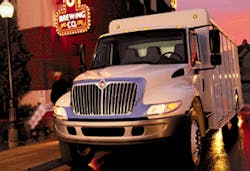Navistar International Corp. and MAN Nutzfahrzeuge AG (MAN), based in Munich, Germany, today announced they have inked a “strategic agreement to collaborate on design, development, sourcing and manufacturing of components and systems for commercial trucks.”
Both MAN and Navistar International, through its operating company International Truck and Engine Corp., produce trucks, buses and diesel engines. The primary market for International is North and South America, while MAN operates mainly in Europe.
The deal would leave the two OEMs fully independent but would allow combining their manufacturing and sourcing volume, as well as let them share in development costs, MAN stated in a press release.
“This agreement is one of a number of opportunities we are exploring for strategic growth in order to achieve long-term success and to meet our goal of reaching $15 billion in revenues and commensurate returns by the end of the current business cycle,” said Navistar chairman, president, & CEO Daniel C. Ustian.
“We have a strategic collaboration agreement with MAN and we are exploring a number of opportunities to expand out International engine product line and to offer the value of integrated products for our customers,” said International Engine Group president Jack Allen.
“With this alliance we aim to reach world-class volumes for systems and heavy truck engines, giving us considerable synergies, economies of scale and flexibility in supplying plants,” said Hakan Samuelsson, CEO of MAN.
Analyst Chris Brady, president of Commercial Motor Vehicle Consulting, told Fleet Owner that the partnership is one result of the recent acceleration in diesel emissions standards in both the U.S. and Europe.
“On both sides of the Atlantic,” said Brady, “there’s pressure on engine makers to develop engines that conform to tighter emissions standards, which is costly to both manufacturers. There’s also the need to tool up machinery to produce the new engines, which is another great expense. Years ago engines would have a 15-year run— now with emissions standards there’s a lot of money being put into new engines. And alone [the companies’] balance sheets may not be strong enough to support that.
“The drive for higher volumes implies that MAN will add International engines to its lineup and vice versa,” added Brady. “It sounds like an engine-supply agreement coupled with sharing the cost of research and development.”
International was contacted, but at press time would not issue any further comment on the terms of the agreement.
